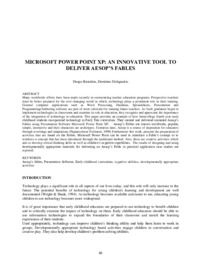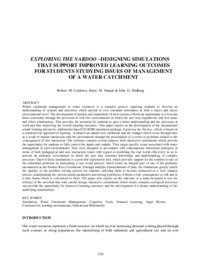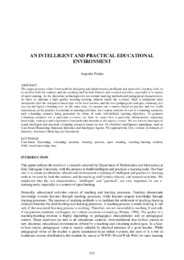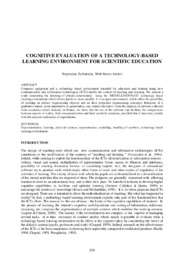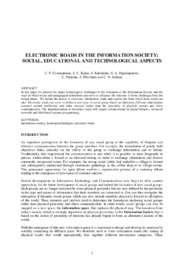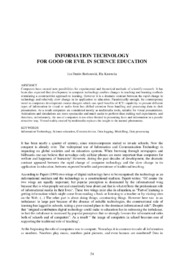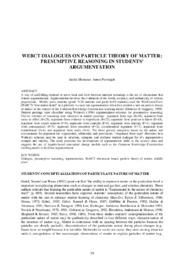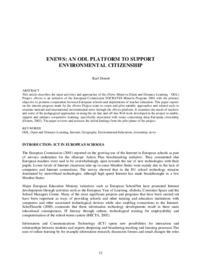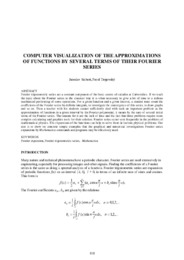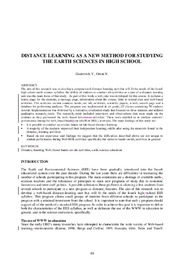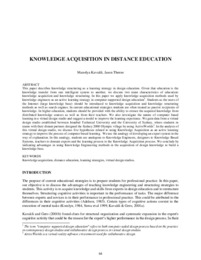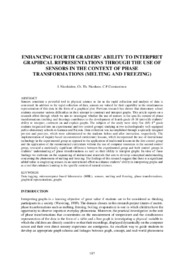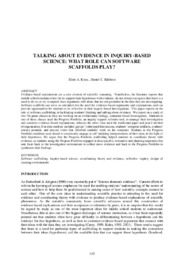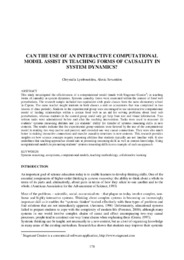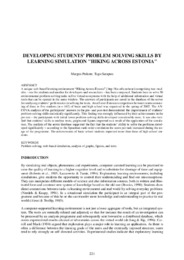Browsing CBLIS Conference Proceedings 2003 Volume II: The educational potencial of new technologies by Issue Date
Now showing items 1-20 of 25
-
Microsoft power point xp: an innovative tool to deliver Aesop’s fables
(Department of Educational Sciences, University of Cyprus, 2003)Many worldwide efforts have been made recently in restructuring teacher education programs. Prospective teachers must be better prepared for the ever-changing world in which, technology plays a prominent role in their ... -
Exploring the nardoo –designing simulations that support improved learning outcomes for students studying issues of management of a water catchment
(Department of Educational Sciences, University of Cyprus, 2003)Whole catchment management of water resources is a complex process requiring students to develop an understanding of systems and processes which operate at over extended timeframes at both a macro and micro environmental ... -
The status of computer based technologies and science education in the southern metropolitan region of Victoria, Australia
(Department of Educational Sciences, University of Cyprus, 2003)Integrating computer-based technologies into all Key Learning Areas of every school’s curriculum has been a priority school policy of the Victorian government since the mid -1990s. Over the last 10 years, huge sums of money ... -
An intelligent and practical educational environment
(Department of Educational Sciences, University of Cyprus, 2003)This paper presents a Java framework for designing and implementing intelligent and practical e-learning tools, to be used by both the students and the teaching staff in their didactic and research activities, especially ... -
Cognitive evaluation of a technology-based learning environment for scientific education
(Department of Educational Sciences, University of Cyprus, 2003)Computer equipment and a technology based environment intended for education and training using new communication and information technologies (ICTs) mofify the context of teaching and learning. We present a study concerning ... -
Electronic roads in the information society: social, educational and technological aspects
(Department of Educational Sciences, University of Cyprus, 2003)In this paper we present the major technological challenges to the formation of the Information Society and the ways in which social and pedagogical restrictions can serve to influence the outcome of those challenges from ... -
Information technology for good or evil in science education
(Department of Educational Sciences, University of Cyprus, 2003)Computers have created new possibilities for experimental and theoretical methods of scientific research. It has been also expected that development in computer technology enables changes in teaching and learning methods ... -
WebCT dialogues on particle theory of matter: presumptive reasoning in students’ argumentation
(Department of Educational Sciences, University of Cyprus, 2003)A way of scaffolding students to move back and forth between multiple meanings is the use of discussions that feature argumentation. Argumentation involves the evaluation of the worth, accuracy, and authenticity of various ... -
Enews: an odl platform to support environmental citizenship
(Department of Educational Sciences, University of Cyprus, 2003)This article describes the main activities and approaches of the eNews Minerva (Open and Distance Learning - ODL) Project. eNews is an initiative of the European Commission SOCRATES Minerva Program 2001 with the primary ... -
Computer visualization of the approximations of functions by several terms of their Fourier series
(Department of Educational Sciences, University of Cyprus, 2003)Fourier trigonometric series are a constant component of the basic course of calculus at Universities. If we teach the topic about the Fourier series in the classical way it is often necessary to give a lot of time to a ... -
Sunset project: creation of computer and observational network for student educational research
(Department of Educational Sciences, University of Cyprus, 2003)A pilot project is presented, aimed at creation of an educational network of astronomical observations performed by middle-school, high-school and university students at different geographical latitudes. Project participants ... -
Distance learning as a new method for studying the earth sciences in high school
(Department of Educational Sciences, University of Cyprus, 2003)The aim of this research was to develop a computerized distance-learning unit that will fit the needs of the Israeli high-school earth-science syllabus. the ability of students to conduct lab-activities as a part of a ... -
Knowledge acquisition in distance education
(Department of Educational Sciences, University of Cyprus, 2003)This paper describes knowledge structuring as a learning strategy in design education. Given that education is the knowledge transfer from one intelligent system to another, we discuss two main characteristics of education: ... -
Enhancing fourth graders’ ability to interpret graphical representations through the use of sensors in the context of phase transformations (melting and freezing)
(Department of Educational Sciences, University of Cyprus, 2003)Sensors constitute a powerful tool in physical science as far as the rapid collection and analysis of data is concerned. In addition to the rapid collection of data, sensors are valued for their capability in the simultaneous ... -
Ecologies of parental engagement and preservice science teacher education: the design and development of a multimedia case-based environment “p a r e n t s”
(Department of Educational Sciences, University of Cyprus, 2003)The purpose of this paper is to present the rationale and principles that guided the design and development of a multimedia case-based environment, called PARENTS. Following a development research approach, the tenets of ... -
Talking about evidence in inquiry-based science: what role can software scaffolds play?
(Department of Educational Sciences, University of Cyprus, 2003)Evidence-based explanations are a core element of scientific reasoning. Nonetheless, the literature reports that middle school students often fail to support their hypotheses with evidence, do not always recognize that ... -
Can the use of an interactive computational model assist in teaching forms of causality in system dynamics?
(Department of Educational Sciences, University of Cyprus, 2003)This study investigated the effectiveness of a computational model (made with Stagecast Creator1) in teaching forms of causality in system dynamics. Systems causality forms were examined within the context of food web ... -
Developing students' problem solving skills by learning simulation "hiking across Estonia"
(Department of Educational Sciences, University of Cyprus, 2003)A unique web-based learning environment “Hiking Across Estonia” (http://bio.edu.ee/tour/) comprising two modules – one for students and another for developers and researchers – has been composed. Students have to solve 30 ... -
Using an interactive simulation to enhance procedural skills in grade 5
(Department of Educational Sciences, University of Cyprus, 2003)The discrepancy between what we teach and what scientists and citizens need is greater than most instructors realise. Science for citizenship and science in the technical workplace, both involve greater emphasis on procedural ... -
The use of mind mapping software to improve primary school students’ ability to construct scientific arguments
(Department of Educational Sciences, University of Cyprus, 2003)The purpose of this study was to examine elementary school students’ ability to construct scientific arguments. We set out to analyze students’ arguments in aspects of structure and validity of claims, before and after ...
